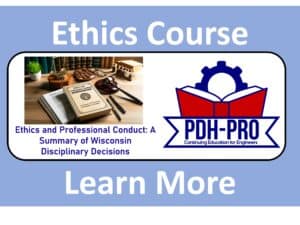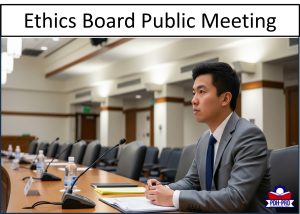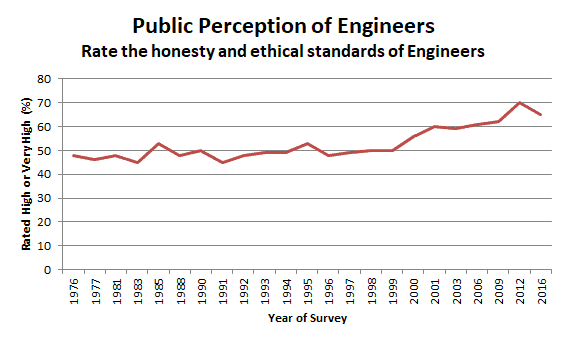Top 6 Ethics Citations Engineers Receive
Table of Contents
Professional Engineers are bound by the canon of ethics that their state engineering boards develop. This ethics code is a critical part of the trust that the public has in the profession. Without trust, the system we rely on for ensuring safe and reliable infrastructure could not exist and would cease to function properly.
State engineering boards investigate every allegation of unethical behavior. All of these investigations are part of the public record. We conducted an exhaustive survey of the disciplinary decisions from numerous boards, and we found some interesting trends.
Continuing Education Course: Ethics and Professional Conduct: A Summary of Wisconsin Disciplinary Decisions – 3 PDH
Engineers are Highly Respected
Before we launch on a discussion of the disciplinary decisions made against engineers, it is important to note that, as a group, professional engineers are very honest and highly ethical. A recent Gallup poll asked Americans which professions they respect the most. Engineers were ranked fifth overall, and the medical profession (nurses, doctors, pharmacists) took the other top positions. Members of Congress received the lowest score for honesty – 58% of the respondents said politicians have low or very low levels of honesty and ethical standards.
One interesting trend, the public’s perception of professional engineers has increased year over year. In 1976, the first year the poll was conducted, engineers were rated at 48%. By 2016, engineers had moved up to 65%.
Gallup asked Americans this question: Please tell me how you would rate the honesty and ethical standards of people in these different fields – very high, high, average, low, or very low.
Most Common Ethics Violations in the State of Texas
The Texas Board of Professional Engineers publishes all of its disciplinary decisions (here is the link). Here are the most common ethics violations, by category.
- Practicing without a license
- Negligence
- Improper Use of Seal and/or Title Block
- Continuing Education
- Felony Conviction
- False Statements
Some of these may seem shocking at first, but the category descriptions are very broad and capture some technical violations. In addition, many of the violations are minor in nature and the punishment might only consist of a written reprimand or requiring the licensee to complete an ethics course.
Ethical behavior and professionalism is how engineers are expected to treat clients, employers, the public, and other engineers. The overwhelming majority of TBPE enforcement is related to ethics, rather than technical incompetence.
Here is more detail for each of these main areas of citations.
Violation 1 – Practicing without a license
Most of the charges related to practicing without a license are cases where the engineer failed to renew his or her license by the deadline but continued to provide engineering services. The Board generally views this type of violation as an administrative error and the punishment is a small fine, written reprimand, and/or a mandatory ethics course. In almost every case, the professional engineer admitted their mistake and the Board showed leniency. A few cases in this category were issued to people who are not engineers but were offering engineering services. We don’t count these in our analysis because we want to focus on professional engineers.
Violation 2 – Negligence
Cases within this category include errors, omissions, and outright incompetence on the part of the engineer. Examples cited by the Board and the disciplinary measures include:
- Gross negligence (revocation + $3,000 fine)
- Failure to exercise care and diligence in the practice of engineering (1 year probated suspension + $1,500.00)
- Incompetence; includes performing work outside area of expertise (3 year suspension + $3,000)
- Misdemeanor or felony conviction without incarceration relating to duties and responsibilities as a professional engineer (3 year suspension + $3,000)
The central issue was the definition of what constitutes gross negligence. The general definition used by an engineering board is “What lifts ordinary negligence into gross negligence is the mental attitude of the defendant.” It must be shown that the engineer was consciously, i.e., knowingly, indifferent to the public’s rights, welfare and safety. In other words, the Board must show that the professional engineer knew about the peril, but his acts or omissions demonstrated that he didn’t care. Such conduct can be active or passive in nature.
Violation 3 – Improper Use of Seal and/or Title Block
There are a lot of cases involving engineers who didn’t stamp a drawing or report that should have been sealed, or instances where they used their seal when they did not perform/supervise the work, their license was expired or revoked, or their work put the public in danger. For a detailed review of proper sealing and stamping requirements, check out our article.
Here are examples of citations with the penalties handed out by the Board:
- Failure to safeguard seal (Reprimand + $1,000)
- Failure to sign, seal, date work, or include firm identification on work (Reprimand + $500)
- Alter work of another(1 year probated suspension +$1,000)
- Sealing work not performed or directly supervised by the professional engineer (Reprimand + $1,000)
- Practice or affix seal with expired or inactive license (1 year probated suspension + $500)
- Practice or affix seal with suspended license (Revocation + $3,000)
- Sealing work endangering the public (Revocation + $3,000)
- Work performed by more than one engineer not attributed to each engineer (Reprimand + $500)
Violation 4 – Continuing Education
Many cases are brought against professional engineers for matters related to the continuing education requirements. Most infractions are due to failing to earn enough CEU credits or falsely reporting that all required hours were earned. Surprisingly, many engineers fail to read the license renewal carefully, and they mistakenly certify that they have earned all of the continuing education credits, when, in reality, they have not. This leads to a charge of making a false statement – which is clearly an ethics violation, and a situation where the licensee has no defense other than they didn’t read what they were signing. Read our well-researched articles summarizing the continuing education requirements for Texas engineers and Wisconsin engineers.
Many charges are related to an engineer practicing outside his area of competence. In Texas, competency is defined as:
- Protection of Public Health, Safety, Welfare
- Texas does not license by discipline, but Professional Engineers must not practice outside of their competence.
- 137.59(a) Engineers shall practice only in their areas of competence.
- Competence gained by Education and Experience
Violation 5 – Felony Conviction
This disciplinary action speaks for itself. Individual engineers are essentially ambassadors for the profession. The public would quickly loose confidence if the engineering community were comprised of criminals. Punishments for this type of violation include:
-
- Misdemeanor or felony conviction without incarceration relating to duties and responsibilities as a professional engineer (3 year suspension + $3,000)
- Felony Conviction with incarceration (Revocation + $3,000)
Violation 6 – False Statements
The public, clients, and employers all rely on professional engineers being truthful and honest. Lying and making false statements is counter to the canon of ethics. The term “false statements” includes more than lying. It can include deceptive business practices, false advertising, and not disclosing conflicts of interests to clients or employers. Here are some of the penalties handed out by State Engineering Boards.
- Failure to engage in professional and business activities in an honest and ethical manner (2 year probated suspension +$2,500)
- Misrepresentation; issuing oral or written assertions in the practice of engineering that are fraudulent or deceitful (2 year suspension + $2,500)
- Misrepresentation; issuing oral or written assertions in the practice of engineering that are misleading (1 year probated suspension + $1,000)
- Conflict of interest ( 2 year suspension + $2,500)
- Accept compensation from more than one party for services on the same project (2 year probated suspension + $2,500)
- Solicit professional employment in any false or misleading advertising (1 year probated suspension + $2,500)
Most Common Ethics Violation Video
Types of Disciplinary Penalties for Professional Engineers
State engineering boards have several tools to enforce ethical standards and protect the public. Penalties are designed to match the seriousness of the violation while encouraging compliance and professional growth.
Here are the most common disciplinary actions boards impose:
- Reprimand. A formal statement of disapproval that becomes part of the public record. Even though it is the lightest penalty, it can affect an engineer’s reputation and license renewals in other states.
- Fines. Monetary penalties help deter misconduct. Boards can impose fines that may reach thousands of dollars per violation, depending on severity.
- Probation. The licensee continues practicing but under strict conditions. These might include extra training, audits, supervision, or reporting requirements.
- Suspension. Temporarily invalidates the license. The engineer must meet specific conditions to return to practice, emphasizing accountability and remediation.
- Revocation. Permanently cancels the license. Reserved for the most serious violations, revocation protects the public from unethical or incompetent practitioners.
- Refusal to Renew. The board may deny license renewal if the engineer has unresolved violations or has failed to comply with orders.
These penalties serve as a clear reminder of the responsibility that comes with the engineering license. They help preserve the integrity of the profession and maintain public trust.
What Can You Do If an Engineering Board Sanctions You
 All State Engineering Boards have statutory authority to enforce the engineering laws and, in most cases, their own rules. Most Boards are allowed to impose an administrative penalty in cases where a licensee has violated the State Engineering Laws or a Board rule. The State Engineering Board may suspend or revoke an engineer’s license based on the results of their investigation. If this happens, that person has rights, just as a person who is charged with a crime does. Here are some of your rights if you find yourself accused of an ethics violation:
All State Engineering Boards have statutory authority to enforce the engineering laws and, in most cases, their own rules. Most Boards are allowed to impose an administrative penalty in cases where a licensee has violated the State Engineering Laws or a Board rule. The State Engineering Board may suspend or revoke an engineer’s license based on the results of their investigation. If this happens, that person has rights, just as a person who is charged with a crime does. Here are some of your rights if you find yourself accused of an ethics violation:
- The engineer is entitled to a hearing.
- An engineer whose license has been revoked may file suit to vacate the Board’s decision. In most states, the engineer can file suit in the district/superior/county court where he/she resides or where the alleged offense occurred.
- The Board may reissue an engineering license if they have sufficient reason to reissue the license.
The Final Take
Engineering ethics is a critical part of the work that engineers do, which is why every state engineering has developed a canon of ethics. Professional engineers must familiarize themselves with these rules and follow them closely throughout their career. Failing to comply with the engineering board’s ethics requirements can lead to disciplinary action and loss of reputation.
Contributor: Jordan Ellis

